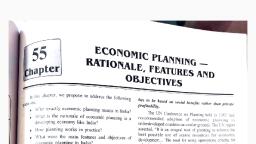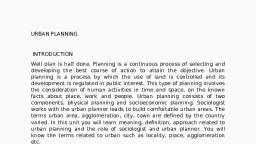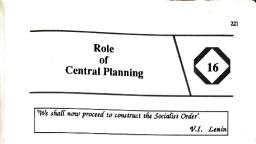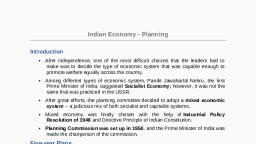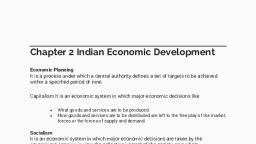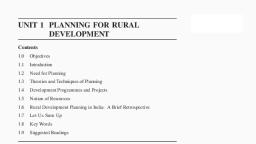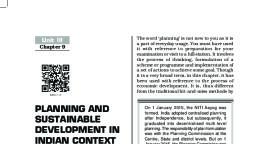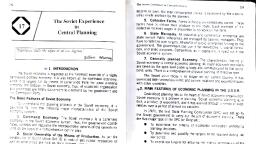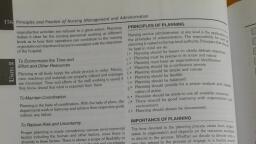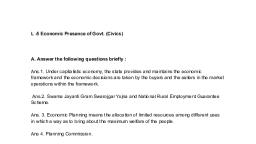Page 1 :
Chapter 52, VECONOMIC PLANNING, MEANING OF ECONOMIC PLANNING, There is no agreement among economists with regard to the meaning of, the term 'economic planning'. The term has been used very loosely in, economic literature. It is often confused with communism, socialism or, economic development. Any type of state intervention in economic, affairs has also been treated as planning. But the state can intervene, even without making any plan. What then is planning?(Planning is a, technique, a means to an end being the realization of certain, pre-determined and well-defined aims and objectives laid down by a, central planning authority. The end may be to achieve economic, social,, political or military objectives. Therefore, "the issue is not between a, plan and no plan, it is between different kinds of plans.", Professor Lewis has referred to six different senses in which the term, planning is used in economic literature. “First, there is an enormous, literature in which it refers only to the geographical zoning of ractors,, residential buildings, cinemas and the like. Sómetimes this is called, town and country planning and sometimes just planning. Secondly., 'planning' means only deciding what money the government will spend, in the future, if it has the money to spend. Thirdly, a 'planned economy, is one in which each production unit (or firm) uses only the resources of, men, materials and equipment allocated to it by quota and disposes of, its product exclusively to persons or firms indicated to it by central, order. Fourthly, 'planning' sometimes means any setting of production, targets by the government, whether for private or public enterprise., Most governments practise this type of planning if only sporadically., and if only for one or two industries or services to which they attach, special importance. Fifthly, here targets are set for the economy as a, whole, purporting to allocate all the country's labour, foreign exchange, raw materials and other resources between the various branches of the, 'L. Robbins, Economic Policy and International Order, p. 6., 1
Page 2 :
economy." And, finally, "the word 'planning' is sometimes used to, describe the means which the government uses to try to enforce upon, private enterprise the targets which have been previously determined."2, But Ferdynand Zweig maintains that 'planning' is planning of the, economy, not within the economy. It is not a mere planning of towns,, public works or separate section of the national economy, but of the, economy as a whole. Thus planning does not mean piecemeal planning, but overall planning of the economy., Some of the definitions of economic planning are: Professor Robbins, defines economic planning as "collective control or supersession of, private activities of production and exchange.", To Hayek, planning means, 'the direction of productive activity by a, central authority., According to Dr. Dalton, “Economic planning in the widest sense is, the deliberate direction by persons incharge of large resources of, economic activity towards chosen ends.", Lewis Lordwin defined economic planning "as a scheme of economic, organization in which individual and separate plants, enterprises, and, industries are treated as coordinate units of one single system for the, purpose of utilizing available resources to achieve the maximum, satisfaction of the people's needs within a given time.", In the words of Zweig, "Economic planning consists in the extension, of the functions of public authorities to organization and utilization of, economic resources...Planning implies and leads to centralization of, the national economy.", One of the most popular definitions is by Dickinson who defines, planning as "the making of major economic decisions what and how, much is to be produced, how, when and where it is to be produced, to, whom it is to be allocated, by the conscious decision of a determinate, authority, on the basis of comprehensive survey of the economic system, as a whole.", 489, Even though there is no unanimity of opinion on the subject, yet, economic planning as understood by the majority of economists implies, deliberate control and direction of the economy by a central authority, for the purpose of achieving definite targets and objectives within a, specified period of time., Need for Planning in Underdeveloped Countries, One of the principal objectives of planning in underdeveloped, countries is to increase the rate of economic development. In the words, "W.A. Lewis, The Principles of Economic Planning, 1954., n-in f Free Societies, p. 14., 2
Page 3 :
be satisfactory and because it is further held that appropriate external, ment and directing it properly. Planners seek to bring about a, rationalization, and if possible and necessary, some reduction of, intervention will result in increasing considerably the pace of develop., consumption, to evolve and adopt a long-term plan of appropriate, a programme of training and education through which the competence, their exploitation, agricultural and industrial output, transport, technic-, opportunities; to reduce inequalities of income and wealth and, increase national income and per capita income; to expand employment, concentration of economic power; to raise agricultural production;, 3. Objectives. The plan may lay down the following objectives: t, to the available and potential natural resources along with the degree of, al and non-technical personnel etc., are essential for fixing targets and, priorities in planning. It, therefore, requires the setting up of a central, tanning, 492, investment of capital resources with progressively improved techniques, of labour to make use of capital resources is increased, and a bee, distribution of the national product so as to attain social security and, peace. Planning, therefore, means, in a sense, no more than better, organization, consistent and far-seeing organization and comprehensive, all-sided organization. Direction, regulations, controls on private, activity, and increasing the sphere of public activity, are all parts of, organizational effort."5, Plan Formulation and Requisites for Successful Planning, The formulation and success of a plan require, 1. Planning Commission. The first prerequisite for a plan is the, setting up of a planning commission which should be organised in a, proper way. It should be divided and sub-divided into a number of, divisions and sub-divisions under such experts as economists, statisti-, cians, engineers, etc, dealing with the various aspects of the economy., 2. Statistical Data. A prerequisite for sound planning is a thorough, survey of the existing a potential resources of a country together with its, deficiencies. As Baykov puts it: "Every act of planning, in so far as it is, not mere fantastic castle building presupposes a preliminary investiga-, tion of existing resources., of statistical data and information with regard to the total available, material, capital and human resources of the country. Data pertaining, the, following:, »6, Such a survey is essential for the collection, statistical organization with a network of statistical bureaux, collecting statistical data and information for the formulation of the, plan., to, to, SIbid., The Develanin-, 3
Page 4 :
Economic Planning, industrialise the eeonomy; to achieve balanced regional development;, to achieve self-reliance, etc. The various goals and objectives should be, realistic, mutually compatible and flexible enough in keeping with the, requirements of the economy., 4. Fixation of Targets and Priorities. The next problem is to fix targets, and priorities for achieving the objectives laid down in the plan. They, should be both global and sectoral. Global targets must be bold and, cover every aspect of the economy. They include quantitative produc-, tion targets, so many more million tons of foodstuffs, coals, steel,, fertilizers, etc., so many kilowatts of power capacity, so many metres of, railways and roads, so many additional training institutions, so much, increase in national income, saving, investment, etc. There are also, sectoral targets pertaining to individual industries and products in, physical and value terms both for the private and public sectors. Global, and sectoral targets should be mutually consistent in order to attain the, required growth rate for economy. This necessitates determining, priorities. Priorities should be laid down on the basis of the short-term, and long-term needs of the economy keeping in view the available, material, capital and human resources., Such schemes or projects which are required to be executed first,, should be given top priority while the less important should have a low, priority. The scheme of priorities should not be rigid but may be, changed according to the requirements of the country. Thus "sound, governmental planning consists of establishing intelligent priorities for, the public investment programme and formulating a sensible and, consistent set of public policies to encourage growth in the private, 493, »7, sector., 5. Mobilisation of Resources. A plan fixes the public sector outlay for, which resources are required to be mobilised. There are various internal, and external resources for financing a plan. Savings, profits of public, enterprises, net marketing borrowings, taxation and deficit financing, are the principal internal sources of finance for the public sector. Net, budgetary receipts corresponding to external assistance relate to the, external sources of financing the plan. The plan should lay down such, policies and instruments for mobilising resources which fulfil the, inancial outlay of the plan without inflationary and balance of, payments pressures. At the same time, they should encourage corporate, and household savings of the private sector., 'W.A. Lewis, Development Planning, 1966., chapters in parts Four and Five of the, -afar to
Page 5 :
progresses. There should be balance between saving and investment,, economy, otherwise shortages or surpluses will arise as the plan, between manpower requirements and their availabilities, and between, between the available supply of goods and the demand for them,, incorrupt administration is the sine qua non of successful planning. But, stould first prepare good feasibility reports of proposed projects before, Ine ECOIOICS UI DurCIupICIJ and, 7. Incorrupt and Efficient Administration. A strong, efficient and, the success of a plan. The Central Cabinet in an underdeveloped, this is what an underdeveloped country lacks the most. Lewis regards a, administrative staff should be appointed in various ministries which, Planning, 494, the demand for imports and the available foreign exchange., Aggregate savings come from various sources such as, savings, taxation, profits of public enterprises, foreign remittances by, nationals, etc. These must equal planned aggregate investment in fixed, capital assets and inventories in the economy. The balance between the, supply and demand for goods requires balancing of the available supply, of consumption goods with their demand, of the supply of capital goods, materials and inventories with their requirements, of the supply of, intermediate goods with their demand, and the proposed requirements, of exports of goods with their supplies. Balances are also required, between planned demand and supply of manpower, and between import, requirements and the available foreign exchange during the plan period., In fact, two kinds of balances must be secured in a plan. The first is, the physical balance which consists of balancing the planned increase in, output of various goods with the amounts and types of investment. It, also requires the balancing of the outputs of the various sectors of the, economy. This is achieved through the input-output technique because, the output of one sector, producing its output. Physical balancing is essential for the internal, consistency of the plan, otherwise such physical obstacles as lack of raw, materials, manpower, etc., will develop in the economy. The second is, the monetary or financial balance which consists of balancing the, incomes of the people with the amount of goods available to them for, consumption, the funds used for private investment and the amount of, investment goods available to private investors, the funds used for, public investment and the amount of investment goods produced by the, public sector, and the balancing of foreign payments and receipts. 1he, lack of these financial balances will lead to disequilibrium in the suppy, and demand for physical goods thereby leading to inflationary and, balance of payments pressures during planning., voluntary, industry is the input of the other for, strong, competent and incorrupt administration as the first eondition 1o, country should not take important economic decisions hurriedly witho, getting them properly examined from technical advisers. Compete




